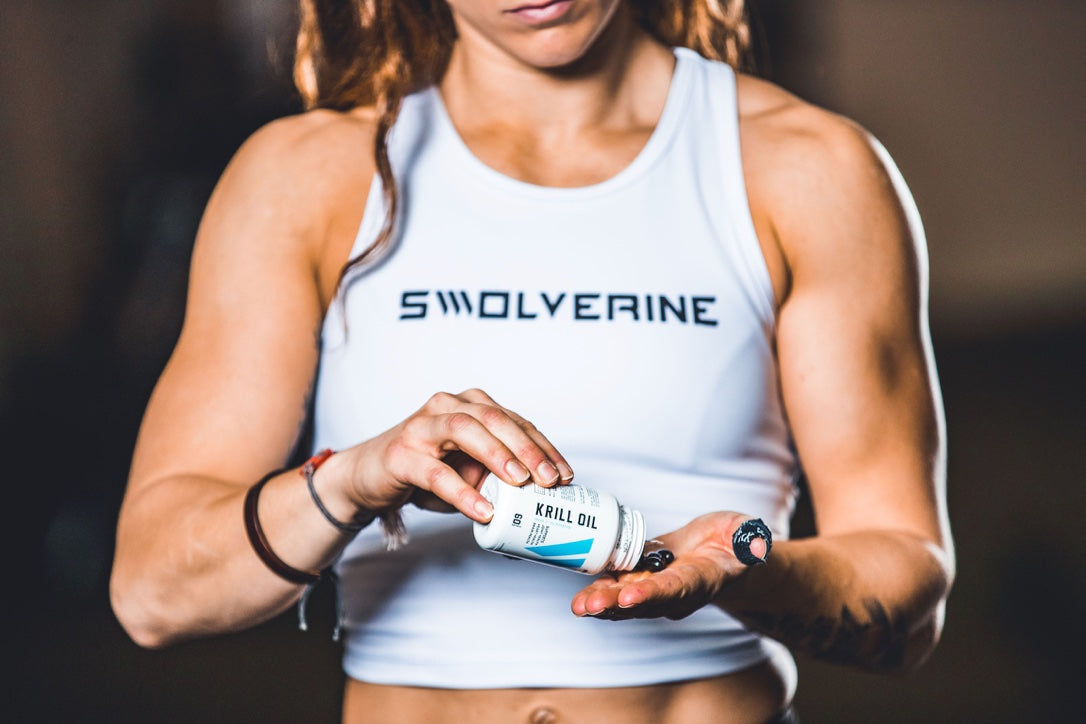Over the past several years, Krill Oil has become the preferred source for Omega-3 supplementation. Why? Krill Oil is high in essential fatty acids (EFA), is more bioavailable than fish oil, contains a powerful antioxidant knows as Astaxanthin and has a longer shelf life than fish oil. So if you’re looking for a superior source of Omega-3, Krill oil is your answer.
What Is Krill Oil?
Krill oil is a dietary supplement derived from krill—tiny, shrimp-like marine crustaceans that inhabit the deep, cold waters of the Antarctic Ocean. These creatures feed primarily on phytoplankton, making them a vital part of the ocean’s food chain and a rich source of omega-3 essential fatty acids.
Krill may be small, but they represent a massive presence in the marine ecosystem. In fact, krill account for the largest biomass of any animal species in the world, with an estimated population mass of over 389 million tons
Atkinson et al., 2009, Deep-Sea Research Part II.
In simpler terms—krill aren’t going anywhere. Their abundance and rapid reproduction make them one of the most sustainable sources of omega-3s available.
Krill Oil Is High in Essential Fatty Acids (EFAs)
What makes krill oil particularly valuable is its high concentration of essential fatty acids—especially:
-
Eicosapentaenoic acid (EPA)
-
Docosahexaenoic acid (DHA)
These long-chain omega-3 fatty acids are critical for:
-
Cardiovascular health
-
Cognitive function
-
Reducing inflammation
-
Supporting joint and muscle recovery
Calder, 2015, Nutrients
Unlike fish oil, the omega-3s in krill oil are bound to phospholipids, not triglycerides. This unique structure allows for superior absorption and bioavailability, making krill oil more efficient at delivering its benefits with lower doses compared to traditional fish oil
Ulven & Holven, 2015, Frontiers in Nutrition.
Additionally, krill oil contains astaxanthin, a powerful marine antioxidant known for its role in:
-
Fighting oxidative stress
-
Supporting immune function
-
Reducing signs of aging
Fassett & Coombes, 2011, Marine Drugs
Why Essential Fatty Acids Matter — And Why You Should Take Krill Oil
For those who may not be familiar, essential fatty acids (EFAs) are fats that your body requires to function properly—but cannot produce on its own. These include:
-
Omega-3 fatty acids (anti-inflammatory)
-
Omega-6 fatty acids (pro-inflammatory)
While the body can synthesize certain fats, omega-3 and omega-6 must be obtained through food or supplementation
Simopoulos, 2002, Biomedicine & Pharmacotherapy.
The Omega Imbalance in the Modern Diet
Here’s the issue: the typical American diet is heavily skewed toward omega-6s, primarily from processed seed oils, fried foods, and packaged snacks. Omega-6 is involved in initiating inflammation, which is necessary in small amounts—but problematic when unbalanced.
On the flip side, omega-3s help reduce inflammation and support critical processes such as:
-
Brain function
-
Joint mobility
-
Mood regulation
-
Cellular repair
-
Skin health
Calder, 2015, Nutrients
Unfortunately, most people consume far too much omega-6 and not enough omega-3, leading to potential issues like:
-
Chronic fatigue
-
Joint pain or stiffness
-
Mood swings or irritability
-
Brain fog and poor focus
-
Dry or inflamed skin
Why Krill Oil Is the Solution
This is where krill oil shines. Rich in EPA and DHA, krill oil helps restore the omega-3 to omega-6 balance, lowering systemic inflammation caused by a poor diet. Unlike omega-6, which already dominates your plate, omega-3 is often missing—and krill oil offers it in its most bioavailable form.
Its unique phospholipid structure allows for faster absorption and better cellular integration than fish oil, and its astaxanthin content provides powerful antioxidant protection.
So, if you're wondering whether you should be taking omega-3s—the answer is clear: yes, you should. And krill oil is one of the most efficient, sustainable, and effective ways to do it.
RECOMMENDED PRODUCT: Krill Oil (60 Servings)
Krill Oil Helps Slow Down the Aging Process
One of the most compelling benefits of krill oil lies in its potential to support skin health and slow the visible signs of aging. Thanks to its unique combination of omega-3 fatty acids (EPA and DHA) and the powerful antioxidant astaxanthin, krill oil helps reduce oxidative stress and support skin structure and hydration at the cellular level.
Astaxanthin has been shown to neutralize free radicals, which—when present in high concentrations due to UV exposure and environmental damage—can lead to:
-
The breakdown of collagen and elastin
-
Loss of skin elasticity
-
Wrinkles and age spots
Fassett & Coombes, 2011, Marine Drugs
Meanwhile, the omega-3 content in krill oil helps normalize skin lipids, keeping skin barrier function strong and promoting deep hydration, which reduces the appearance of fine lines and enhances skin texture.
What the Research Says
Clinical evidence suggests that supplementing with krill oil can:
-
Improve skin elasticity
-
Reduce wrinkles and fine lines
-
Even out skin texture and tone
Chalyk et al., 2017, Lipids in Health and Disease
Recommended dosage: At least 500 mg of krill oil daily to support skin and cellular health.
RECOMMENDED PRODUCT: Krill Oil + Astaxanthin (60 Servings)
Krill Oil Helps Elevate Mood
Eicosapentaenoic acid (EPA) and docosahexaenoic acid (DHA)—the two primary omega-3s in krill oil—have shown impressive potential in supporting mental health, particularly when it comes to elevating mood and reducing symptoms of depression.
-
DHA plays a role in increasing serotonin and dopamine, neurotransmitters often referred to as the brain’s “feel good” chemicals
-
EPA has been shown to reduce inflammation in the brain, which may play a role in neuroinflammation-related depression
Su et al., 2015, Journal of Clinical Psychiatry
Clinical studies have compared the mood-enhancing effects of omega-3s to some antidepressants, showing similar biochemical impacts on neurotransmitter regulation—without the side effects.
Krill Oil Helps Treat PMS Symptoms
From bloating and fatigue to mood swings and joint pain, premenstrual syndrome (PMS) affects millions of women each month. The common thread among many of these symptoms? Inflammation.
Krill oil, with its potent anti-inflammatory properties, has been shown to significantly reduce:
-
Menstrual cramps and joint/muscle pain
-
Bloating, digestive issues, and fatigue
-
Headaches and backaches
Emotionally, the mood-lifting effects of krill oil can also help manage the mental and hormonal fluctuations of PMS. This includes:
-
Reduced anxiety and irritability
-
Improved focus and cognitive clarity
-
Stabilized mood swings
These outcomes are largely attributed to increased dopamine and serotonin secretion, as well as reduced neuroinflammation during the luteal phase of the menstrual cycle.
Whether you're looking for a more natural solution to support emotional wellness, skin clarity, or monthly symptom relief—krill oil offers a powerful, research-supported solution.
Krill Oil Benefits: Better Brain Health
One of the most compelling long-term benefits of krill oil is its role in protecting cognitive function. The Framingham Heart Study, one of the most well-known longitudinal health studies in the U.S., followed 5,209 individuals from Framingham, Massachusetts over a 57-year period.
Among its many findings, researchers discovered that individuals who consumed just 180 mg of DHA per day—about 2.5 servings of fish per week—experienced a 50% reduced risk of developing dementia
Tan et al., 2012, Alzheimer’s & Dementia.
For most people, dementia may seem like a distant concern—but anyone who has witnessed a loved one struggle with memory loss knows just how devastating it can be. The ability to recognize loved ones, navigate everyday life, and retain independence is not guaranteed as we age—but research suggests that omega-3 supplementation can help protect these cognitive functions.
Taking krill oil consistently now may serve as a powerful tool in your long-term brain health strategy—while you can still remember to do it.
Krill Oil Supports a Healthy Heart
Heart disease remains the leading cause of death in the United States, and with obesity rates on the rise, cardiovascular risk continues to grow
CDC, 2023.
What if you could significantly reduce your risk with one daily habit?
That’s exactly what a landmark study published in the New England Journal of Medicine found. Starting in the mid-1980s, researchers followed 20,551 male physicians over 17 years. The results?
-
Those with the highest blood levels of DHA and EPA had a 90% lower risk of sudden cardiac death
Albert et al., 2002, NEJM
EPA and DHA—both found in abundance in krill oil—play a key role in:
-
Reducing triglycerides
-
Lowering blood pressure
-
Raising HDL ("good") cholesterol
-
Decreasing inflammation in arterial walls
If you're looking to extend both your lifespan and healthspan, krill oil is one of the most well-researched and effective natural options available.
Krill Oil Supports Healthy Joints
Inflammation is a necessary part of the body's repair system, but chronic inflammation—especially in joints and connective tissue—can lead to discomfort, reduced mobility, and long-term pain.
Krill oil contains potent anti-inflammatory compounds, including EPA, DHA, and astaxanthin, that help reduce swelling, stiffness, and discomfort in joints and surrounding tissues
Deutsch, 2007, Journal of the American College of Nutrition.
How It Works:
-
Astaxanthin helps reduce oxidative stress and inflammation at the cellular level
-
Krill oil lowers levels of C-reactive protein (CRP)—a key inflammatory marker produced by the liver
-
Regular use of krill oil has been shown to improve joint mobility, particularly in those with arthritis or post-exercise joint pain
If you’re experiencing soreness after workouts or dealing with early signs of arthritis, krill oil can help reduce pain, improve flexibility, and enhance recovery.
RELATED ARTICLE: 14 Studies That Prove Krill Oil Is Better Than Fish Oil for Athletes
Should I Take Krill Oil? Takeaway
We could go on for hours about the benefits of krill oil—how it supports cell membrane integrity, hormone production, brain and nervous system function, and even thyroid and adrenal health.
But here’s the bottom line:
You are not getting enough omega-3s from food. Period.
Most diets today—yes, even the "clean" ones—are omega-3 deficient and omega-6 dominant. This imbalance creates systemic inflammation, disrupts metabolic processes, and slowly starts to shut down critical systems in your body.
You may not notice it today, but if you’re struggling with:
-
Brain fog or low energy
-
Joint stiffness or soreness
-
Mood swings or low motivation
-
Skin issues or poor recovery
-
Hormonal irregularity
There’s a good chance your omega-3 to omega-6 ratio is off.
And the only question that matters now is:
Are you going to do something about it?
Supplementing with a high-quality krill oil is one of the simplest, most effective ways to start taking back control of your health—at the cellular level.
Looking for the best Krill Oil supplement to help improve your overall health and wellness?
SWOLVERINE's Krill Oil contains 500mg of Omega 3 phospholipids and Astaxanthin which are scientifically proven to help protect your heart, reduce post-workout inflammation for joints, improve immune system function, lower your blood pressure, reverse the effects of aging, and increase brain function. Coated with a subtle hint of vanilla, our Krill Oil has no fishy aftertaste and is easy to swallow. Click the image below and buy yours today!
SWOLVERINE is an endurance athlete and active lifestyle brand. Made for the elite athlete, and the strong-willed our products were designed to fuel your athletic performance. We perform when you perform.
We believe that everyone can optimize not only their athletic performance but their human potential. The way we believe we can optimize performance is through transparency, clinically effective doses, and clinically proven ingredients with evidence-based outcomes. We provide the nutrients you need to power your active lifestyle.
References
Davinelli, Sergio et al. “Astaxanthin in Skin Health, Repair, and Disease: A Comprehensive Review.” Nutrients vol. 10,4 522. 22 Apr. 2018, doi:10.3390/nu10040522
Zadeh-Ardabili, Parastoo Mojtahed, and Sima Kianpour Rad. “Anti-pain and anti-inflammation like effects of Neptune krill oil and fish oil against carrageenan-induced inflammation in mice models: Current status and pilot study.” Biotechnology reports (Amsterdam, Netherlands) vol. 22 e00341. 18 Apr. 2019, doi:10.1016/j.btre.2019.e00341
Suzuki, Yoshio et al. “Krill Oil Improves Mild Knee Joint Pain: A Randomized Control Trial.” PloS one vol. 11,10 e0162769. 4 Oct. 2016, doi:10.1371/journal.pone.0162769













